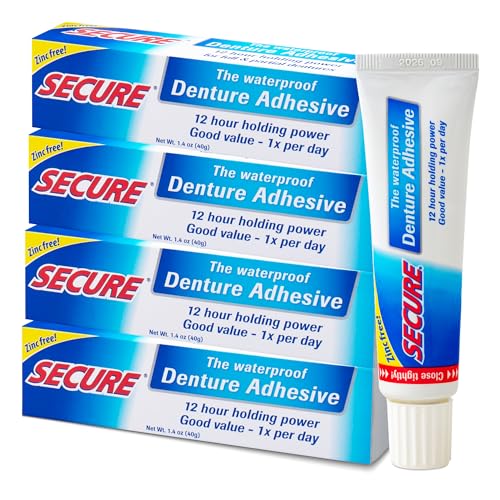It is always a laughable experience to see denture wearers losing their dentures into their cups when they try to sip a drink. There are many ways your dentist can install a denture. However, many will try to avoid using denture adhesives, which create some permanence, because of the danger many have associated with these adhesives.
Dentures are one of those prosthetic devices that make it possible for people with missing or no teeth to smile again. While some dentures are removable, some are plastered around the surrounding hard tissues of the oral cavity to give them a somewhat permanent feel.
However, in order to prevent the unfortunate event of having your denture slip off embarrassingly, dentists rely on denture adhesive to help glue down your denture to ensure a long-lasting and permanent feel. These denture adhesives could be in the form of denture adhesive strips, paste, or powder.
All medical content on this site, including this guide and other product reviews, is written by our team of experienced writers and researchers. All writers from The Toothbrush Expert are recommended and reviewed in the industry. You support us through our editorially chosen links, which earn us commission. Learn more
All of our picks have the American Dental Association (ADA) Seal of Acceptance.
Potential Risks of Denture Adhesive
Although one would expect something that goes into the mouth and stays there a long time would be non-toxic, there have been concerns about how safe these dental adhesives are and possible health concerns they may raise.
Every loose-fitting denture will need a denture adhesive to stay right in place. It is not uncommon for patients to find the smell of these adhesives somewhat repulsive. Still, aside from the odor, many leading experts are beginning to question the safety of these dental adhesives.
It is now common to find dental adhesives with flavor additives to eradicate the odor. However, not so much has been done to reduce the health implication of excessive use of denture adhesives. You will find that most dental adhesives contain zinc. Zinc is one of those essential minerals that humans generally need. At the right amount, it could be beneficial as zinc contains enzymes that stimulate human growth.
Zinc helps to facilitate cell development, which is crucial for bone marrow development, fertility, digestion, and improving immune cells. However, when the intake becomes excessive, it may lead to other complicated health challenges. Therefore, what a loose denture needs isn’t more adhesives. Little adhesives are needed to hold dentures in place.
When you have ill-fitting dentures, it might result from not having the right size installed, or you being in urgent need of a replacement. In some cases, you may have your denture relined to have it fit comfortably again without needing excessive dental glue.
The frequent application of adhesive products on your denture may increase the volume of zinc in your body, which could be very toxic for you. Below, you will find some associated risks that excessive use of adhesive may cause in denture wearers.
| Preview | Product | Rating | Price | |
|---|---|---|---|---|

|
Secure Waterproof Denture Adhesive - Zinc Free - Extra Strong 12 Hour Hold - 1.4 oz (Pack of 4) |
$28.99 |
Buy on Amazon | |
![Cushion Grip Thermoplastic Denture Adhesive for Refitting and Tightening Loose Dentures [Not a Glue Adhesive, Acts Like a Soft Reliner] (1 Oz) Hold Dentures for Up to 4 Days.](https://m.media-amazon.com/images/I/417lMMk2v-L.jpg) ![Cushion Grip Thermoplastic Denture Adhesive for Refitting and Tightening Loose Dentures [Not a Glue Adhesive, Acts Like a Soft Reliner] (1 Oz) Hold Dentures for Up to 4 Days.](https://m.media-amazon.com/images/I/417lMMk2v-L.jpg) |
Cushion Grip Thermoplastic Denture Adhesive for Refitting and Tightening Loose Dentures [Not a Glue... | 24,424 Reviews |
$15.99
$13.99 |
Buy on Amazon |
  |
Super Poligrip Zinc Free Denture and Partials Adhesive Cream, 2.4 ounce (Pack of 4) |
$19.99
$16.94 |
Buy on Amazon |
1 – Dysfunctional Digestive System
Consistently ingesting any denture adhesive product could cause stomach problems for you. Many over-the-counter products, such as denture adhesive creams, such as Super Poligrip, are available to denture wearers without having to seek professional consultation. These products are filled with a complex chemical compound that may hinder your bowel movement when ingested in large quantities.
A very small quantity of adhesive is needed to secure your denture, and if you find excessive denture oozing out after application, it is a sign that you have used too much. Often, dentists and the attached instructions on adhesive products stipulate the denture size one can apply to both the lower and upper denture. Typically, it should not be more than 2.4 ounces, and this measurement should secure your denture for as long as eight weeks.


2 – Neuropathy and Related Issues
Excessive consumption or absorption of zinc from these secure denture adhesives may deplete copper and iron as minerals in the body. This may result in neuropathy, whose symptoms include numbness and tingling.
Sometimes, this can cause extreme pain and numbness, which may result in the inability of a patient to move some parts of their body. No one wants to wake up not being able to use their arms and legs anymore. Also, another common symptom of neuropathy is extreme fatigue. All of these symptoms may result in long-term disability, and in some extreme cases, this may lead to death.
3 – Cancer, Sore Throat and Other Oral Health Conditions
While excessive use of denture adhesives can lead to zinc poisoning, using dental adhesives with low strength can lead to many other oral conditions. The purpose of adhesives is to ensure that your dentures are well secured.
In addition, an ill-fitting denture may result in other complications such as sore throat, dry mouth, and, in extreme cases, may lead to oral cancer. If you wonder how possible these are, a loose-fitting denture will give access to the buildup of food particles.
This may lead to inflammation of the gum area that can get as complicated as leading to cancer.
Sore throat is also a common problem with a loose denture. Any bacteria buildup caused by the accumulation of trapped food particles can easily cause inflammation in your throat and cause pain. Furthermore, since the denture sits in a position close to your respiratory tract, a buildup of bacteria and fungi may be sent into your respiratory organs, such as the lungs, and may cause pneumonia.
4 – Bone Loss
Dentures lack the stimulation of natural teeth, and without adequate stimulation from the natural teeth, the bones that form support for the teeth begin to melt away. At first, this may not pose any health issues, but as more bones melt away, your denture loses its fitness.
This results in forcefully using more dental adhesive products and may lead to complicated zinc issues and other related health issues. With no bones to support a new denture, your options for further dental restoration decrease.
Conclusion
Denture adhesives are not automatically dangerous. Ingestion and excessive use could build up toxicity in the body. Although most denture adhesive products now promise a zinc-free composition, there is no way to confirm this as these products are not mandated to list out all their ingredients. Furthermore, make sure you clean your dentures every night.
Therefore, it is important to seek professional consultation about the right amount of adhesive to use, ensure that you use only the perfect denture size, and discontinue any products that cause irritation or numbness after use.


Dr Michael Jones is the proud founder of The Toothbrush Expert. He has been working as a dentist for 21 years now. Besides his work as a dentist, Michael wants to help people to find the right dental products. His goal is to provide everyone with honest expert reviews on all kinds of dental care products.

